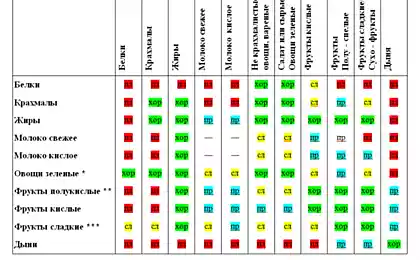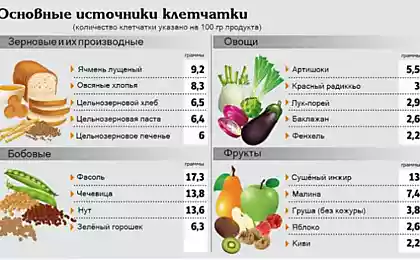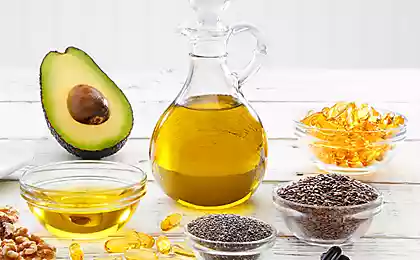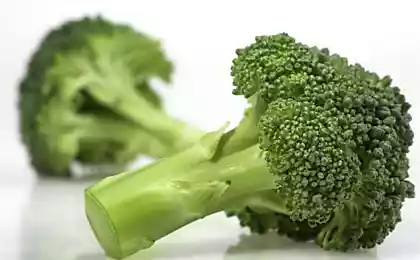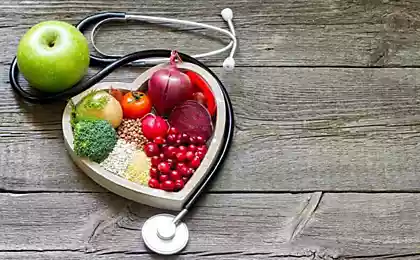482
The amount of food eaten is as important as their quality
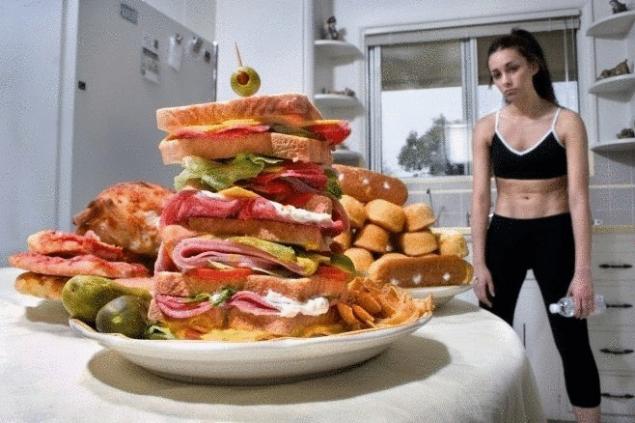
A diet that is plentiful, dangerous, and just as dangerous super-saturation. Those who are by nature bold, closer to death than those who are skinny. © Hippocrates
About the quality of the products that should be eaten to maintain health, said a lot. But it turns out, is no less important and their number. There is not, as the saying goes, "less is more". Let's try, based on scientific facts and common sense, to convince our esteemed opponent — Lover how to eat.
Of course, eat to live. But every action has its meaning. The sense of power — in opposition to the destruction of life. The body uses the energy food helps her to fill. Part of the body wear out over time — food provides building material for their recovery.
Before the food becomes energy and building material, it must be learned. And this is a very complex, multistep process. First eaten the product under the action of the enzymes of the gastrointestinal tract (GIT) is digested breaks down into universal to all living things building blocks: glucose, amino acids and fatty acids. These building blocks are then absorbed from the gastrointestinal tract into the blood and the liver. Further, they can be used for restorative purposes or undergo further disintegration with the release of energy.
I draw your attention to the digestion and absorption of food, the body spends its energy! Spent on the synthesis of enzymes on their release into the digestive "hollow" on the movement of food through the digestive tract, absorption of products of digestion into the blood. And to "pay" all of these processes sometimes takes up to 90% of future energy "profit", to which the body can not immediately, but hours after eating. Only glucose that can be absorbed into the bloodstream already in the mouth, able to quickly restore power.
Lethargy and sleepiness after eating — the result of the redistribution of power in favour of the gastrointestinal tract. And the more a person eats, the more energy the body spends on its absorption. But the margin of safety in the apparatus of digestion is not infinite. And sooner or later there will come a time when the assimilation of food the body is not to be missed neither the strength nor the tools (e.g., enzymes)...
In this case, food is digested not completely and transformed from a potential source of recovery, source of energy and building material, an instrument of destruction of life — "the thief" of energy and "debris". For the little that is absorbed gives enough energy to cover the "costs" for neutralization and excretion of undigested debris. And if the person continues to eat a lot and the energy "debt" continues to grow... And you wonder, where does the energy come from to repay these "debts"? Is taken away from other equally important organs and systems that respond to this energy "robbery" failures in their work. For example, "asbestocement" the immune system is manifested in chronic fatigue, tendency to allergies, infectious and cancer diseases; "asbestocement" nervous — in intelligent dullness, lethargy. It is a vicious circle: the person lack of energy, it tries to repair them abundant food, but the forces are becoming less and less.
Your body requires that it is vital, but what it desperately needs, despite all your efforts. Namely — energy and very specific structural elements (certain vitamins, minerals, amino acids, fatty acids), and different people at different times, this set may be very different. Yes, theoretically, they are found in food, but to get them, it is necessary to break this vicious circle.
How? — Eat less.
Energy a person can get not only from food, and as for the elements... No, let's order. Offers three argument in favor of malaucene: respectively the structural, energetic and psychological keys. How the body can inform you that it is not enough for something in particular, such as fatty acids contained in olive oil? I mean it's a nice language to tell you: "you Want olive oil!" However, he tries to reach up to you. And the loud "knock" — the feeling of hunger. But this signal is very nonspecific.
You eat often not something that requires your body, but that dictate your tastes. The result is a food a lot of little help and the feeling of hunger is still with you. Such as dissatisfaction ("I want something") is a structural famine.
How to find out what your body wants? Ideally starve. And if you can't, then at least temporarily (at least for five days), go on a very moderate and simple, without any of the gastronomic delights of food: only porridge and vegetables without salt, sugar, tea, coffee, meat, dairy products, etc.
Perhaps you just without a doubt will know that today you want to eat this product, but tomorrow or some other (maybe the same). Because it behaves as the diseased animal: refuses food, and then searches and finds the only herb that is able to cure him.
It is important to acquire the taste, because to recognize what is really necessary for your body and what your mind wants is the opportunity to get to know yourself. I did not call you to eat less than your body requires. I'm trying to convince you to try to eat less than your desires and habits. You already know that "the more you eat, the more you want". Take the chance to purchase your own experience in reverse — "the less you eat, the less you want," and the healthier we become.
Different foods give us different amounts of energy, and it is not in dead calories. But that's a topic for another conversation. And now let me give you the second argument in favor of malaucene — key energy.
So far we only talked about the human physical body and physical energy, designed to withstand his destruction and mined the usual way — with food. But the knowledge coming from the depths of centuries, imagine a person being much more complex, not restricted to the physical body. Modern science has dismantled this body "the bones" and almost left in his anatomy and physiology of white spots, but not yet caught and does not describe something that makes this body alive. According to the ancient knowledge alive, that is filled with energy, our physical body is due to the tireless work of the energy body (pranic). This body absorbs different types of energy from the environment (including from the food we eat), transformerait them to a suitable body shape and nourishes it. Please note: the number and quality of these vital energies does not increase with food intake. Because overeating (as well as any kind of excesses) deprives the energy body to efficiently absorb energy and to fill with them our physical body. As a result, the breakdown will only get worse. Slight malnutrition, in contrast, encourages the energy body to the active absorption of such high quality of energy that you will feel no hunger and sleepiness, and energy, liveliness, ability a lot of fruitful work. "Isn't that the goal that everyone desired"?
Mild malnutrition is when you don't "fall off" from a table, and vigorously come out from behind him, feeling a slight feeling of hunger. Bear with me for a few minutes, and this feeling will pass, especially if you switch to something interesting and important. For example, imagine that the phone rings and separates you from dinner. You leave the table, say 10-15 minutes, go back to the table and was surprised to find that there are already don't want.
Third argument: in the spiritual practices are not far to seek. You can work on yourself, making even the most familiar, everyday actions. Conscious attitude to the diet can turn a normal absorption of food in the wonderful practice of control of desires, overcoming dependency and development will. Nourish your body, but do not entertain his selfish desires to have more than he needs! Believe me, learning to observe moderation in food, to overcome greed and to abandon the excess, you will gain valuable experience in the fight against his own selfishness. Experience that will be very useful in life. Experience that will allow you to regain and maintain health and strength not only the body but also the soul.
Food for thought
In the 30-ies of XX century works of McKay was found that a diet with restriction of calories by 30-50% increases the maximum and average lifespan of rats and mice. Instead of the three years of experimental animals lived four and a half years. And not just longer lived, but remained mobile, healthy and full of energy. The caloric restriction increases the lifespan also have Guinea pigs, fish, amphibians, insects, unicellular organisms.
For more than 10 years experiment on rhesus monkeys, caloric intake which restricted 30%. Preliminary results showed that the experimental animals compared with the control group look noticeably healthier, they have a decreased pressure, cholesterol and blood sugar, etc.
Restriction of caloric intake leads to compensatory slowing, or increasing the efficiency of metabolic processes. And the slower and more efficient metabolism, the longer the life. Diet of limited caloric value to six times reduced risk of cancer and three times the risk of developing cardiovascular pathologies in rats. Moreover, the effect of prolongation of life was observed in the translation on a diet of "older" animals.
Scientists from the University of Florida have found that limiting the caloric intake of rats by 40% is two times increases the level of protein that protects nerve cells from death.
When restricting caloric intake is not observed age-related decline in the function of the pineal gland, hormones which have distinct geroprotective effect, that is, protect from aging.
As reported in the journal of the American medical Association, the restriction of caloric intake reduces the incidence of breast cancer.
At Johns Hopkins University found that men middle-aged and elderly, whose daily intake does not exceed 1200 calories suffer from prostate cancer three to four times less likely than their peers to absorb over 2600 calories.
In the USA there is the Association of supporters of moderate power Calorie Restriction Society, which has around 1,000 members. Some of them switched to moderate food in 80-ies. Recently Professor of the University of Washington examined 18 people in the US and Canada both sexes, aged from 35 to 82 years, including in this Association. The control group consisted of 18 clinically healthy Americans middle-aged and elderly eating normally. The results showed that the supporters of food abstinence average blood pressure, lipid and carbohydrate metabolism, etc. are at the level of norms for healthy young people. In General, doctors believe that these people are much less likely to get diabetes, atherosclerosis, hypertension, cancer, Alzheimer's disease (senile dementia), etc., rather than the absolute majority of their peers.
источник:newacropolis.ru
Source: /users/1077
Will look like the computers of the near future
Why the current generation of 30-year-old pathologically unhappy











